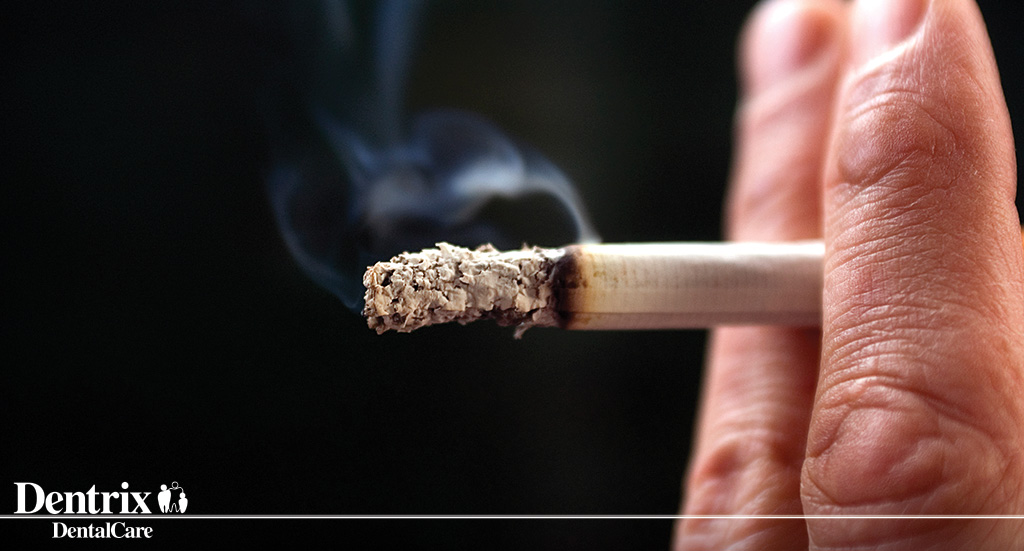By now most people are aware that smoking is bad for their health. At the very least, they’re aware of the impact smoking can have on their lungs and respiratory system; coughing fits, emphysema, chronic lung conditions, and even lung cancer are just some of the risks of frequent smoking. But what many people don’t realize is how badly smoking can affect your teeth and overall oral health.
Oral Health of Effects of Smoking
Common oral health issues caused by smoking include:
- Foul breath
- Severely reducing the speed at which your mouth can heal from injuries, diseases and surgeries.
- Discolor teeth.
- Significantly increase the likelihood of getting oral cancer.
Smoking increases the likelihood you’ll have dental problems. According to the CDC:
- 16% of smokers have poor dental health; this is four times the rate of people who have never smoked.
- Smokers are less likely to visit the dentist.
- Over a third of smokers have at least 3 dental issues.
Smoking and Gum Disease
More than 40% of all periodontal disease in the US can be attributed to smoking. Smokers are over 60% more likely to develop gum disease than non-smokers.
There are a few reasons smoking has such a remarkable impact on the likelihood of contracting gum disease:
Firstly, smoking lowers the amount of oxygen delivered to the soft tissue of the mouth. This helps bacteria to thrive.
Secondly, smoking constricts the blood circulation to the mouth. This decreases the chance that early stage gum disease will bleed, which is one of the most obvious early warning signs. This in turn results in the gum disease being harder to spot until it’s more advanced than in non-smokers.
Thirdly, smoking limits your immune response, making it much harder for your body to fight the gum disease once it’s appeared.
Lastly, tobacco in any form — smoked, chewed, etc. — can increase tartar and plaque build up. This is in part because it decreases saliva production, which is responsible for washing away a lot of bacteria out of the mouth.
All of these factors combined increase the risk of gum disease, increase the damage caused by gum disease, and making treating it that much harder. Contracting severe periodontal disease is much more likely for smokers than non-smokers.
Smoking and Teeth
All of the gum disease issues mentioned above will eventually result in your teeth weakening, breaking, or even needing extraction in worst case scenarios.
As for the teeth themselves, smoking has a number of ways of affecting them directly. The most obvious issue is staining. Cigarette smoke stains teeth yellow-brown, much like excessive tea or coffee consumption will. With cigarettes, however, there’s an added factor that makes discoloration more likely and faster presenting: Fine grit particles in some cigarettes that scratch and wear down the enamel of your teeth.
When the protective layer of enamel is worn down, the underlying tooth structure will stain very quickly.
Chewing tobacco isn’t much better. Most brands also feature sugar as an ingredient, so chewing tobacco will have much the same long-term effect as chewing any sort of sugary sweet or gum.
Smoking and Oral Surgeries
Smoking is one of the single biggest contra-indicators to most types of oral surgery. For example, people who smoke are generally not considered suitable candidates for dental implant surgery. While a non-smoker can expect their dental implants to last many decades, smokers have much higher failure rates over much shorter time spans.
Partially the problem is the compromised immune response, and partially it’s because of the increased risk of infection following an invasive surgery. Smoking simply presents too many risks for non-essential oral surgeries and is more likely than not to lead to being ineligible for a treatment.
Oral Care for Smokers
The obvious best course of action is to quit smoking — but everyone knows that is something much, much easier said than done.
It’s important for smokers to be extra diligent with their oral hygiene — brushing and flossing twice a day before or after meals and keeping a close eye on the health of their teeth.
If you smoke and notice the signs of gum disease, it’s best to see your dentist as soon as possible. Let them know that you smoke, so that they can tailor a treatment plan for your needs. Regular cleaning protocols may not be aggressive enough to prevent major health concerns.
Solutions for smoking-related oral health problems can range from the simple to the complex, such as:
- Mouthwash
- Oral antibiotics
- Doxycycline gel
- Bone surgery
- Soft tissue grafts
- Flap surgery to remove bacteria from beneath gums
- Deep cleaning
If you smoke and have concerns for your oral health, contact us today. We can help monitor the health of your mouth and teeth and work towards a care plan that gives you the best possible chance of avoiding serious complications in the future.

